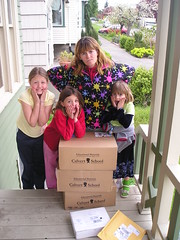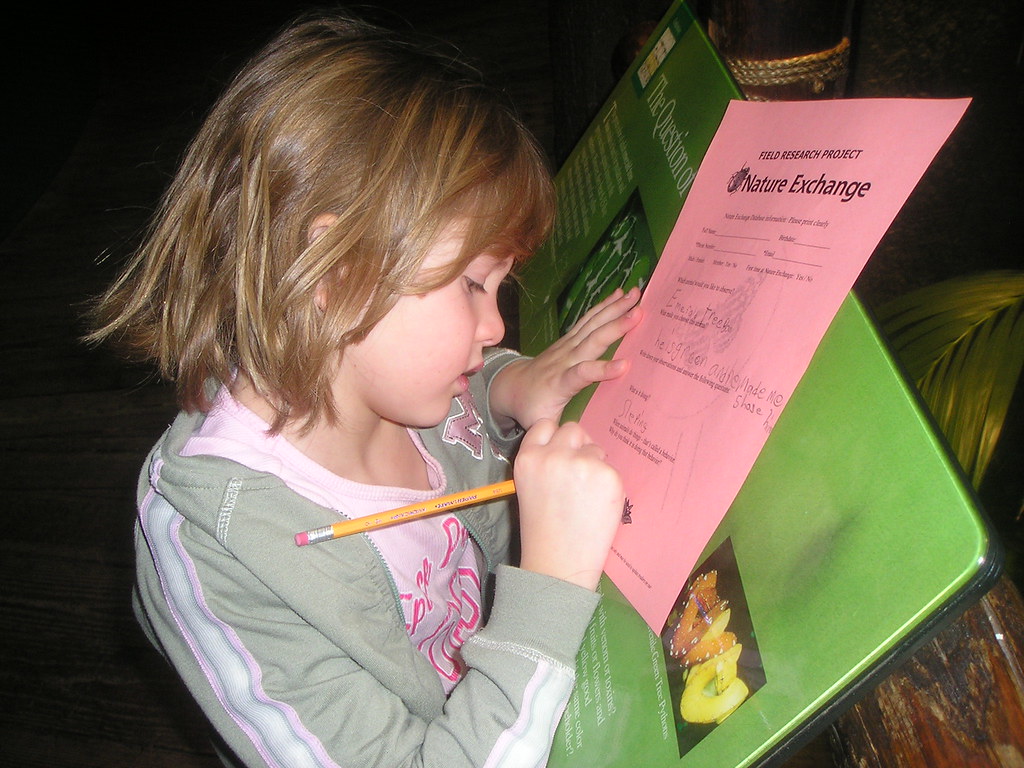Oddly, when I tell people that my husband and I are preparing to move on to a sailboat and sail south for a few years with our children, the most common and immediate question is, “But what are you going to do with your children?” As if, somehow, Dean and I have found a magical answer to this ages-old problem. What do any of us do with our children? We love them, we tolerate them, and we lock them in the closet when they are really horrid.
But what they are really asking is some variation of “Don’t they have to go to school?” Actually, the answer to that question is “No. They don’t.” There is this persistent urban myth in the United States that our choices for educating our children are: Bad (e.g. Expensive Private Schools) or Worse (e.g. Lousy Public Schools). And for many, this is true. Economically, you may not be able to afford any other possibility, and you may have no ability to influence the quality of the public school choice available. (Though as an aside, I have an unfair share of public school principles in my immediate family who would argue that public schools are not as bad as most folks think.)
Having said all that, a bit of research and a willingness to completely overturn the natural order of things reveals that there is a third choice which is neither bad nor worse, though it may be insane. You can homeschool your children.
In fact, the homeschool movement is growing rapidly as parents increasingly choose to opt out of this system and take their children with them. It depends on whom you read whether this trend originated in the 1960’s with a bunch of granola-eating commune hippies or has been around much longer under the banner of Christian fundamentalism liberally dashed with a peculiarly American brand of libertarianism. In any case, homeschool families have gained a reputation for complete lunacy, their offspring shunned as the spawn of whackos raised in an atmosphere of insulated mono-ideology. Public school couldn’t possibly be worse than homeschoolers.
Of course it can. While Columbine and the like might be the exception, they prove the rule. Public schools are not precisely the bastion of moral rectitude, quality education, and the relentless pursuit of social norms that everyone supposes. And if your children are not getting a really good education at your local school, if you can’t be sure that someone won’t go postal and shoot a classroom full of adolescents on Tuesday, and you want to opt out of the regular rat race for yourself anyway, you could do worse than using education as your excuse.
For there really is no more righteous excuse for staying home and kicking it than educating the next generation of America’s leaders, scientists and citizens. Go to the zoo in the name of our country’s great future. Bake manicotti, watch Discovery Channel, and spend hours at the aquarium to nurture the promise of tomorrow.
In the end, it just doesn’t matter what you do with your kids. Steve D. Levitt and Stephen J. Dubner, authors of Freakonomics: A Rogue Economist Explores the Hidden Side of Everything, demonstrate that the amount of time you spend with your kids and the amount of money you spend on their education is considerably less important than choices you made twenty years ago. Your level of education, economic accomplishments to date, and the quality of your genetic contribution are all considerably more determinant. In other words, you can’t screw up by teaching them yourself.
Another myth is that you are legally obligated to send your children to school. Not true! Very few states require even the most rudimentary proof that you are actually engaged in teaching when you pull your kids out of the public school system. In our “tough” state of Washington, you must have a Master’s degree or be under the supervision of someone with a Master’s degree. I suspect this requirement came as a result of some legislative aid in Olympia reading Steve and Steve and musing to himself, “Well as long as they’ve got a Master’s, it just doesn’t matter. So what the hell, let them homeschool the kids!” As a result, a cottage industry sprung up in this state of women with a Master of Arts in basket weaving or neuroscience who supervise the rest of us great unwashed homeschool parents through the divine powers of reading monthly e-mail reports.
A final myth I would like to bust here is that you’ll kill your children. I am reminded of a great phrase from What to Expect the First Year in which the author absolved all incipient parents for their fleeting desire to drown their offspring by wrapping them in a burlap sack and throwing them off the Thames like a litter of alley kittens. She noted that every parent is allowed to possess this feeling. What you are not allowed to do is act on it. Homeschooling is a lot like that.
“What are you going to do with your children?”
“I’m going to take my girls on the trip of their lives during which we will also cover the basics: reading, writing, and the proper preparation of fresh caught ahi with wasabi and pickled ginger,” I reply. Only I recognize that the last skill is clearly the one most likely to ensure their success in the 21st century.
But what they are really asking is some variation of “Don’t they have to go to school?” Actually, the answer to that question is “No. They don’t.” There is this persistent urban myth in the United States that our choices for educating our children are: Bad (e.g. Expensive Private Schools) or Worse (e.g. Lousy Public Schools). And for many, this is true. Economically, you may not be able to afford any other possibility, and you may have no ability to influence the quality of the public school choice available. (Though as an aside, I have an unfair share of public school principles in my immediate family who would argue that public schools are not as bad as most folks think.)
Having said all that, a bit of research and a willingness to completely overturn the natural order of things reveals that there is a third choice which is neither bad nor worse, though it may be insane. You can homeschool your children.
In fact, the homeschool movement is growing rapidly as parents increasingly choose to opt out of this system and take their children with them. It depends on whom you read whether this trend originated in the 1960’s with a bunch of granola-eating commune hippies or has been around much longer under the banner of Christian fundamentalism liberally dashed with a peculiarly American brand of libertarianism. In any case, homeschool families have gained a reputation for complete lunacy, their offspring shunned as the spawn of whackos raised in an atmosphere of insulated mono-ideology. Public school couldn’t possibly be worse than homeschoolers.
Of course it can. While Columbine and the like might be the exception, they prove the rule. Public schools are not precisely the bastion of moral rectitude, quality education, and the relentless pursuit of social norms that everyone supposes. And if your children are not getting a really good education at your local school, if you can’t be sure that someone won’t go postal and shoot a classroom full of adolescents on Tuesday, and you want to opt out of the regular rat race for yourself anyway, you could do worse than using education as your excuse.
For there really is no more righteous excuse for staying home and kicking it than educating the next generation of America’s leaders, scientists and citizens. Go to the zoo in the name of our country’s great future. Bake manicotti, watch Discovery Channel, and spend hours at the aquarium to nurture the promise of tomorrow.
In the end, it just doesn’t matter what you do with your kids. Steve D. Levitt and Stephen J. Dubner, authors of Freakonomics: A Rogue Economist Explores the Hidden Side of Everything, demonstrate that the amount of time you spend with your kids and the amount of money you spend on their education is considerably less important than choices you made twenty years ago. Your level of education, economic accomplishments to date, and the quality of your genetic contribution are all considerably more determinant. In other words, you can’t screw up by teaching them yourself.
Another myth is that you are legally obligated to send your children to school. Not true! Very few states require even the most rudimentary proof that you are actually engaged in teaching when you pull your kids out of the public school system. In our “tough” state of Washington, you must have a Master’s degree or be under the supervision of someone with a Master’s degree. I suspect this requirement came as a result of some legislative aid in Olympia reading Steve and Steve and musing to himself, “Well as long as they’ve got a Master’s, it just doesn’t matter. So what the hell, let them homeschool the kids!” As a result, a cottage industry sprung up in this state of women with a Master of Arts in basket weaving or neuroscience who supervise the rest of us great unwashed homeschool parents through the divine powers of reading monthly e-mail reports.
A final myth I would like to bust here is that you’ll kill your children. I am reminded of a great phrase from What to Expect the First Year in which the author absolved all incipient parents for their fleeting desire to drown their offspring by wrapping them in a burlap sack and throwing them off the Thames like a litter of alley kittens. She noted that every parent is allowed to possess this feeling. What you are not allowed to do is act on it. Homeschooling is a lot like that.
“What are you going to do with your children?”
“I’m going to take my girls on the trip of their lives during which we will also cover the basics: reading, writing, and the proper preparation of fresh caught ahi with wasabi and pickled ginger,” I reply. Only I recognize that the last skill is clearly the one most likely to ensure their success in the 21st century.

